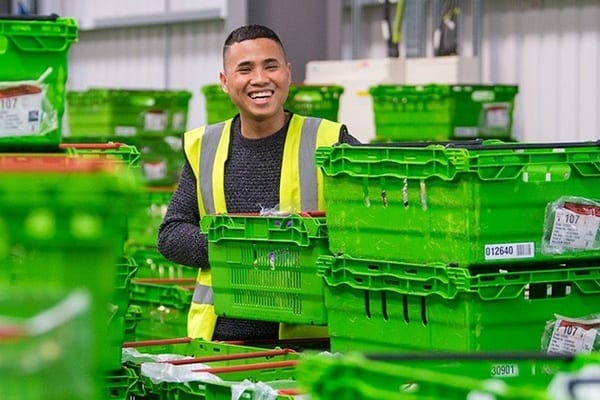On-site coronavirus testing is to start next week in order to allow food business staff who have been pinged by the NHS Covid-19 app or called by Test and Trace to keep working. But neither stores nor the wider retail supply chain are covered by the move, with others expected to keep isolating following a Covid-19 contact until August 16.
Workplaces that are deemed critical in the food industry will be prioritised in the government roll out of priority testing sites. That starts next week and is expected to include as many as 500 sites in total, including large supermarket distribution centres, and as many as 10,000 staff.
Those working at named key sites will be able to keep working as long as they are tested every day. In a separate critical workers scheme, named individuals in the food supply chain will be able to keep working when they are identified as contacts of someone who has tested positive for Covid-19, again, as long as they test.
Health and social care secretary Sajid Javid says: “Throughout this global pandemic, workers in our food and drink sectors have overcome enormous challenges and done everything they can to keep our shelves stocked and our fridges full. As we manage this virus and do everything we can to break chains of transmission, daily contact testing of workers in this vital sector will help to minimise the disruption caused by rising cases in the coming weeks, while ensuring workers are not put at risk.”
But Iceland managing director Richard Walker says that enabling the supply chain will not be enough. The grocer and frozen food retailer is currently taking on an extra 2,000 staff to give it a greater pool of workers and to prevent shops having to close. He tweeted today: “The food supply chain only works if teams are in place at each stage – no point in fixing the manufacturing & logistics issues if there is no one to put products on the shelves & serve customers. We need the Govt to take urgent action and add store workers to the exemption list.”
Some Iceland stores have had to shut as a result of the rising number of Covid-19 cases and related self-isolations, and there are reports of both garages and fashion stores having to do the same. In the seven days to yesterday, 325,223 people tested positive, government figures show. Close contacts of all those people – and more – will still be self-isolating.
Oliver Guy, global industry director, retail at IoT platform and enterprise integration specialist Software AG, says that the shift to in-store retailing shown in today’s ONS figures may be short-lived, as more people are asked to self-isolate, and there may well be a step back towards online shopping. He says: “We can anticipate the current surge for in-store shopping may well be temporary, impacted by the current ‘pingdemic’. As some stores have been forced to cease trading due to staff shortages, a drop in footfall is expected as consumers flock back to online shopping when isolating.”
Jessica McGoverne, director of policy and corporate affairs at responsible supply chain organisation Sedex, says the so called ‘pingdemic’ is reminder of how complex and fragile supply chains are – and what the knock-on effects are when they are disrupted.
“Unsurprisingly, it’s often the most vulnerable workers – such as those operating via informal work situations of zero-hours contracts – who are suffering most. Workers in insecure employment typically have little or no financial buffer, jobs that they can’t do from home while isolating, and a fear of losing their jobs if they don’t continue working. Their employment status means they are unlikely to enjoy such benefits as sick pay and are forced into making difficult and risky decisions.
“Employers therefore need to act responsibly, understanding where their most vulnerable workers exist, so they can take steps to support these workers accordingly. They need to carry out risk assessments now and have a clear approach regarding worker policies, such as how they support every worker who receives the notification to isolate. We know that employers find any guidance that governments and local authorities can offer around this hugely helpful.
“It’s an extremely difficult situation for businesses, but without the right support, individuals that are informed to isolate may put their own health or that of colleagues at risk by continuing to come in to work. There’s also the potential that organisations will have to draft in already overworked employees to cover absences, a step that comes with increased risks around excessive work hours, and health and safety.’









